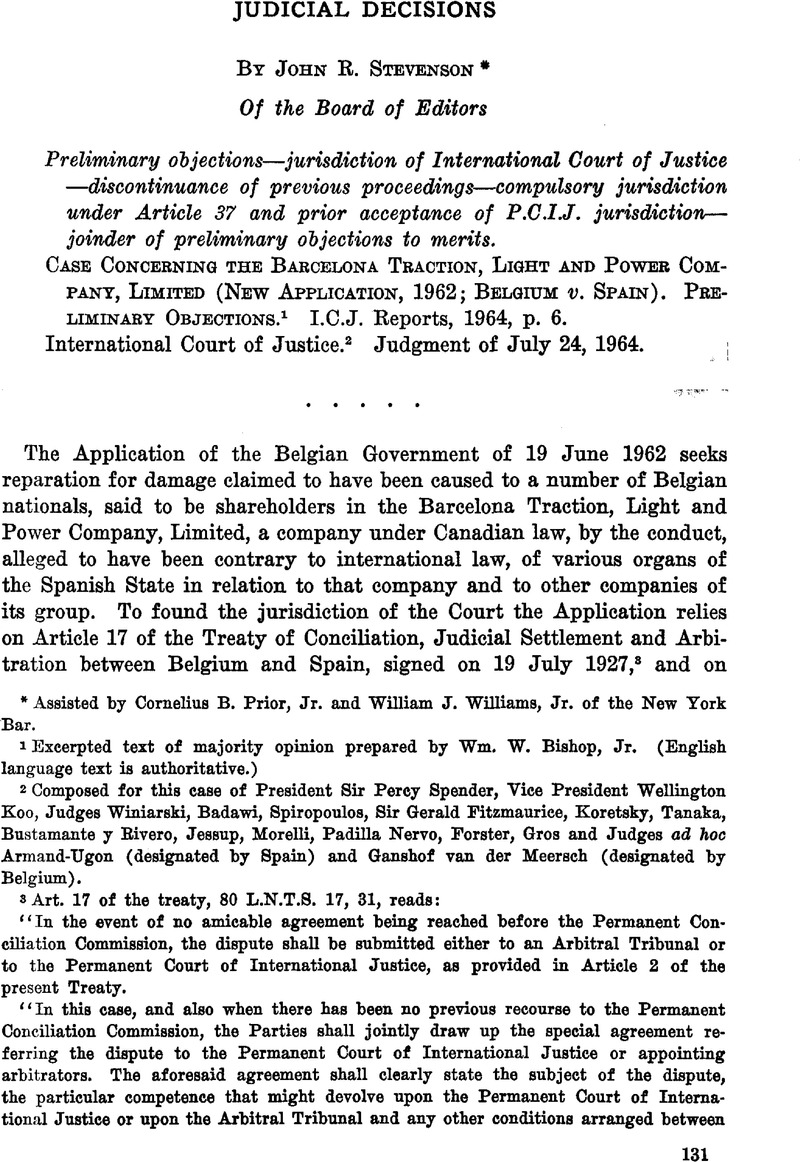Article contents
Case Concerning the Barcelona Traction, Light and Power Company, Limited (New Application, 1962; Belgium v. Spain). Preliminary Objections
Published online by Cambridge University Press: 28 March 2017
Abstract

- Type
- Judicial Decisions
- Information
- Copyright
- Copyright © American Society of International Law 1965
Footnotes
Assisted by Cornelius B. Prior, Jr. and William J. Williams, Jr. of the New York Bar.
References
1 Excerpted text of majority opinion prepared by Wm. W. Bishop, Jr. (English language text is authoritative.)
2 Composed for this case of President Sir Percy Spender, Vice President Wellington Koo, Judges Winiarski, Badawi, Spiropoulos, Sir Gerald Fitzmaurice, Koretsky, Tanaka, Bustamante y Rivero, Jessup, Morelli, Padilla Nervo, Forster, Gros and Judges ad hoc Armand-XJgon (designated by Spain) and Ganshof van der Meerseh (designated by Belgium).
3 Art. 17 of the treaty, 80 L.N.T.S. 17, 31, reads: ” I n the event of no amicable agreement being reached before the Permanent Conciliation Commission, the dispute shall be submitted either to an Arbitral Tribunal or to the Permanent Court of International Justice, as provided in Article 2 of the present Treaty. ” I n this case, and also when there has been no previous recourse to the Permanent Conciliation Commission, the Parties shall jointly draw up the special agreement referring the dispute to the Permanent Court of International Justice or appointing arbitrators. The aforesaid agreement shall clearly state the subject of the dispute, the particular competence that might devolve upon the Permanent Court of International Justice or upon the Arbitral Tribunal and any other conditions arranged between the Parties. This agreement shall be constituted by an exchange of Notes between the two Governments. “The Permanent Court of International Justice, when requested to render a decision on the dispute, or the Arbitral Tribunal, when appointed for the same purpose, shall respectively be competent to interpret the terms of the special agreement. ” I f the special agreement has not been drawn up within three months from the date on which one of the Parties was requested to submit the matter for judicial settlement, either Party may, on the expiry of one month's notice, bring the question direct before the Permanent Court of International Justice by means of a request. “The procedure applicable shall be that laid down by the Statute of the Permanent Court of International Justice or, in the case of recourse to an Arbitral Tribunal, that laid down by the Hague Convention of October 18, 1907, for the Pacific Settlement of International Disputes.''
4 Art. 37 reads: “Whenever a treaty or convention in force provides for reference of a matter to a tribunal to have been instituted by the League of Nations, or to the Permanent Court of International Justice, the matter shall, as between the parties to- the present Statute, be referred to the International Court of Justice.''
5 Concurring, but adding that the Second Objection should be rejected for the reasons in the Joint Dissenting Opinion in the Aerial Incident Case (Israel v. Bulgaria), [1959] I.C.J. Rep. 127, 53 A.J.I.L. 923 (1959).
6 Judge Spiropoulos could not distinguish the Aerial Incident Case (Israel v. Bulgaria) on Objection 2, and disagreed with the majority as to Objections 1, 3 and 4.
7 Judge Koretsky concurred in the Judgment and its reasoning, but added views as to Objection 1.
8 “ I am in full agreement with the Court that no one of the Preliminary Objections could be upheld at this stage, and that the first two must be rejected now for reasons stated in the Judgment. I am also in accord with what the Court has to say about the general considerations which govern a decision to join a preliminary objection to the merits. I agree that those general considerations require that the third and fourth Preliminary Objections should be joined to the merits. Consequently, in order to be consistent with those general considerations, conclusions of law applicable to arguments involved in those two objections, even though I would find them capable of formulation now, may appropriately be deferred until a subsequent stage of the case.“
9 Judge Wellington Koo would have rejected Objection 2 on the grounds of the dissenting opinion in the case referred to in note 5 above. He would not have joined Objection 3 to the merits, but would have rejected it outright, saying: “there is seen a substantial body of evidence of State practice, treaty arrangements and arbitral decisions to warrant the affirmation of the inexplicit existence of a rule under international law recognizing such a right of protection on the part of any State of its nationals, shareholders in a foreign company, against another wrongdoing State, irrespective of whether that other State is the national State of the company or not, for injury sustained by them through the injury it has caused to the company.''
10 Judge Tanaka concurred in the Judgment, but would have used other grounds to reject Objection 2.
11 Judge Bustamante y Rivero differed with the majority on Objection 1, which he would have joined to the merits instead of rejecting. On Objection 3, he thought more information was needed as to the position taken by Canada (the state of incorporation), prior to passing upon the Objection or joining it to the merits.
12 Judge Morelli's dissent was based on the view that the Court should have upheld Objection 2, and found that it lacked jurisdiction. He would have declared Objections
13 and 4 inadmissible as preliminary objections, regarding them as going to the merits. 13 Judge ad hoc Armand-Ugon dissented from all the findings of the Court.
- 7
- Cited by


